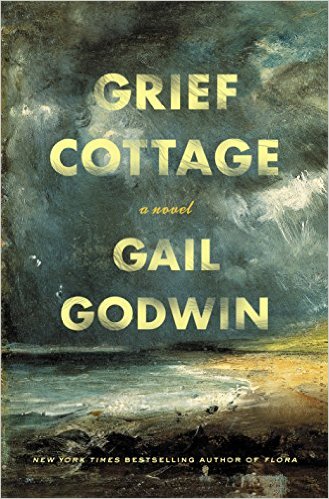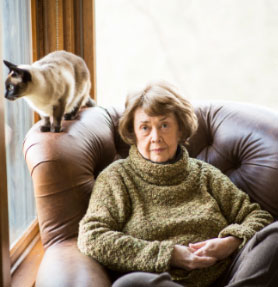Fiction by Gail Godwin
 Grief Cottage
Grief Cottage
A Novel
Published 2017
Grief Cottage a Publishers Weekly Ten Best Books of 2017!
"Godwin’s forceful prose captivates with the quiet, renewing power of a persistent tide." —Publishers Weekly
The haunting tale of a desolate cottage, and the hair-thin junction between this life and the next, from bestselling National Book Award finalist Gail Godwin.
After his mother's death, eleven-year-old Marcus is sent to live on a small South Carolina island with his great aunt, a reclusive painter with a haunted past. Aunt Charlotte, otherwise a woman of few words, points out a ruined cottage, telling Marcus she had visited it regularly after she'd moved there thirty years ago because it matched the ruin of her own life. Eventually she was inspired to take up painting so she could capture its utter desolation.
The islanders call it "Grief Cottage," because a boy and his parents disappeared from it during a hurricane fifty years before. Their bodies were never found and the cottage has stood empty ever since. During his lonely hours while Aunt Charlotte is in her studio painting and keeping her demons at bay, Marcus visits the cottage daily, building up his courage by coming ever closer, even after the ghost of the boy who died seems to reveal himself. Full of curiosity and open to the unfamiliar and uncanny given the recent upending of his life, he courts the ghost boy, never certain whether the ghost is friendly or follows some sinister agenda.
Grief Cottage is the best sort of ghost story, but it is far more than that—an investigation of grief, remorse, and the memories that haunt us. The power and beauty of this artful novel wash over the reader like the waves on a South Carolina beach.
Listen to Gail's interview on NPR:I’m drawn to those crossover places in ghost stories and novels: the hair-thin junctions between sanity as we understand it and what we call “the other side.” In the tales I love best, like Henry James’s “The Turn of the Screw,” the arrival of the ghost coincides with a mental crisis, a disturbance in the character’s experience of the world.
At the same time, a really effective ghost story is grounded in the stuff of daily life. For Marcus, this includes caring for his reclusive aunt, monitoring a nest of Loggerhead turtle eggs, and unpacking the boxes of his former life, with all their disturbing memories. Connoisseurs of the ghost story maintain that a truly satisfying one leaves a window for the possibility of a reality we haven’t discovered yet.
I’ll let you be the judge.
Gail Godwin
What Made Me Write About a Boy
By Gail Godwin
The boy, the idea of the boy, had been with me a long time, but for years he was just “the boy.” It wasn’t until the early summer of 2014, the week of my seventy-seventh birthday, that I heard him thinking inside my mind.
I was on the Isle of Palms in South Carolina. It was early morning at the beach. Between five and eight were “the hours of the dog,” when dogs were allowed to run without leashes. Two sleek young Greyhounds chased each other, skimming the earth; other dogs were diving into the waves for a ball or simply from elation, little dogs were barking at big dogs, then capering around their owners’ legs. The last time I had walked beside the ocean had been on Pawleys Island with Robert Starer. Because we were together, I hadn’t been paying close attention to the things going on around me. Now, on another South Carolina island, I was all too aware that Robert was no longer beside me and I felt like a ghost walking alone on the beach.
As I walked alone and observed more than ever, I suddenly heard the boy’s thoughts: “There were new ocean things for me to discover every day, everything seemed to be sending me some kind of message. Some of the messages made me feel good, others not so good.” The boy has lost his mother and been sent to live on a small South Carolina island with his great-aunt, a reclusive painter with a haunted past. He is eleven. (Writing Flora, I discovered how much I liked writing about pre-adolescent children. It is a transitional stage when you are discovering your powers but are not yet adept at foreseeing the consequences of your acts. You sense that you are turning into something else, but you don’t know what that ‘else’ is going to be.
A newcomer to the ocean, Marcus observes how the patterns in the surf re-draw themselves with each outgoing wash “and would continue to do so after I was dead.” Obviously this boy had death on his mind. Well, fine, so did I.
He will keep walking to the north end of the island and discover the ruined beach cottage his aunt has told him about. (“It matched the ruin of my own life.”) Here he will become aware of the ghost of a boy missing since a hurricane fifty years before. Full of curiosity and open to the unfamiliar and uncanny, he courts the ghost boy, never certain whether the ghost is friendly or follows some sinister agenda. Marcus will never be sure, but this otherworldly confrontation will set a course for his life.
Marcus had a forerunner in my previous novel, Flora. Ten-year-old Helen and Flora, her guardian, tune in every week to a program about the uncanny on the radio. (It is 1945). The previous program Helen and Flora had listened to was a scary one I remembered from my childhood, about a little girl who turns into a manikin. But I had to make up another uncanny program for Helen and Flora to listen to the following week. I imagined a boy who had lost his mother and is sent to live with an aunt on an island. There is a ruined cottage and two adult ghosts, a father and a mother, waiting for their son to return. The boy in my radio program visits them every day while his aunt is painting. The program lasts only thirty minutes, including the commercials, so I had to move quickly through my story and find a conclusion that would be acceptable to sponsors in 1945. The boy doesn’t know the couple were ghosts until after the cottage is demolished and he reports having seen them to an old fisherman. The old fisherman admits the boy’s description jibes with his memory of the couple and their son who died in a fire in the 1890’s. “But look here,” the old fisherman cautions him, “there are some things beyond rational explaining. You say they were kind to you and got you through a bad time. Well, if I were you, I would be grateful for that but I would keep it to myself.” (159, Flora)
During the rest of my time on the Isle of Palms, the boy kept company with me. You might say we co-existed. His name was Marcus. I saw the world through his eleven-year-old consciousness, and made notes of things that would catch his eye. A horseshoe crab that didn’t make it. A white beach dumpster picking up yesterday’s garbage. The big red signs around the roped-off hatching sites: “Loggerhead Turtle Nesting Area. Eggs, Hatchlings, Adults and Carcasses are protected by Federal and State Laws.” The stately pelicans flying in formation towards a goal compared to the skittish gulls, shrieking and getting diverted. And, of course, the “hours of the dog.”
I was sharing a beach house with my younger sister, her grown boys and their wives, and a twelve-month-old boy. I had known my nephews since they were born and was acquainted with their little ways and sayings and quirks. A writer, I don’t recall who it was, told an interviewer, who had asked “how can you write about children when you don’t have any?” that all you needed in order to write about them was “curiosity and love and memories of yourself as a child.” Seeing the love and attention lavished on this year-old boy made me think more about the results of love’s presence—and the consequences of its absence.
This wasn’t to be the first time I wrote from a male viewpoint. The very first story I wrote at age nine was about Ollie McGonnigle, a henpecked husband. In an early novel, Glass People, I wrote about a district attorney at home alone trying on his wife’s clothes—from inside his head. In my big family novel, A Southern Family, I wrote a long chapter from the point of view of the father with his racist upbringing and social inferiority, and I wrote part of another chapter from the point of view of an Austrian-born Jew in middle age having his first experience of the American South. In The Good Husband, a story of two couples, the viewpoints are divided four ways, two women and two men. One husband , an ex-seminarian, is tending to his dying wife; the other husband, a bellicose novelist married to his former editor, is suffering from writer’s block. Father Melancholy’s Daughter is an intimate portrait of an Episcopal priest beset by agonizing depressions, though his painful story is told through the daughter’s voice.
But Marcus would be the first boy to narrate his own story through the entire novel: Marcus from the inside, with his losses, his grief, his curious mind. The story of his first summer on the island with his great aunt would take place in 2004 and the story would be told by the adult Marcus, in 2017.
Why had his great-aunt given up on people? What about the few individuals on the island who have touched her reclusive life: Lachicotte Hayes, the maverick outlier of an old patrician family who rebuilds vintage cars, Coral Upchurch, the ninety-five year old lady in the next cottage who, having nothing left to lose, begins “doing archeology on herself”? What were their stories, and how would Marcus engage with them?
One late June morning back home in Woodstock, I took a book and my beach notebook out to the terrace while two men inside installed a new microwave. The book was Philip Pullman’s retellings of the Fairy Tales from the Brothers Grimm. In his introduction, remarking on how to open a tale, Pullman says: “All we need is the word ‘Once…’ and we’re off.”
While the microwave installers were busy at work in the kitchen, I put Pullman aside and wrote the opening sentence of Grief Cottage in my notebook:
Once there was a boy who lost his mother.
Reviews
"[Godwin] remains a forensically skillful examiner of her characters' motives, thoughts and behavior. Grief Cottage revisits some of her favorite themes--fractured families, parentless children, the initial shock and long-term repercussions of death and disappearance, how the future can run off course in a flash--to make the very good point that it doesn't require a ghost to haunt a life . . . Deeply satisfying." - New York Times
"Godwin may flirt with the magical, but she deals firmly with the realism of depression and loss. It's those psychological ghosts that Grief Cottage is really about." - Washington Post
"Compelling . . . an ambiguous, beguiling tale in which the presence of the supernatural is entangled with--and perhaps precipitated by--characters who are undergoing an emotional crisis." - The Economist
"Godwin's riveting and wise story of the slow coalescence of trust and love between a stoic artist and a grieving boy . . . subtly and insightfully explores different forms of haunting and vulnerability, strength and survival . . . Word will spread quickly about Godwin's tender and spellbinding supernatural novel." - Starred Review, Booklist
"Godwin's forceful prose captivates with the quiet, renewing power of a persistent tide." - Starred Review, Publishers Weekly, "Best Books of 2017"
"An exquisite narrative . . . This grace-filled story probes aspects of life and death, isolation and family, and how great pain and loss can ultimately lead to unforeseen transcendence." - Starred Review, Shelf Awareness
Bloomsbury | Hardcover| 336 pages






